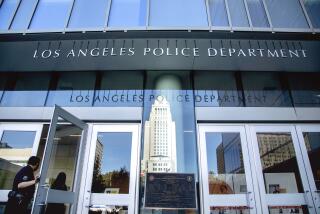LAPD in the cross hairs
The manhunt for Christopher Dorner in one sense ended successfully: Assuming that the body recovered from the burnt-out home in Big Bear is his, Dorner’s rampage is over, and he won’t harm anyone again. Yet it’s hard to cheer an episode that left four people dead and that featured police officers firing wildly on innocent civilians in their determination to eradicate a man who had threatened them.
It’s understandable that police would be enraged by Dorner. He openly declared war on all law enforcement officers and embarked on a killing spree specifically aimed at his former colleagues. But how does that justify the actions of the officers who shot into a truck driven by two newspaper carriers, Maggie Carranza and Emma Hernandez? Carranza is a 47-year-old Latina who was driving a blue Toyota with Hernandez, her 71-year-old mother; officers somehow mistook those two women for a burly African American man driving a gray Nissan. And, in their zeal or under the impression that any force would be tolerated in these circumstances, officers fired away, hitting Hernandez twice in the back. Both women lived, testament to the poor aim, not the good judgment, of the officers.
To be clear: Their actions would be worrisome even if Dorner had been behind the wheel of that truck. Force, including lethal force, is a necessary part of police work, but it may be used only to protect officers or others from harm. It is to be wielded to ensure safety, not to exact vengeance. While it is especially offensive to have that force used against innocent people, it’s even improper to use it in this fashion against the guilty.
FULL COVERAGE: The manhunt for Christopher Dorner
The Los Angeles Police Department has committed itself to reviewing Dorner’s dismissal and the allegations he made in his loopy online manifesto. That’s fine, though the results of that inquiry seem fairly obvious: It would shock any fair-minded observer of today’s LAPD to discover that academy recruits were, as Dorner claimed, breaking into verses of songs of the Hitler Youth. Still, self-reflection is valuable and should offer a reminder that while racism is no longer openly practiced at the LAPD, eliminating even its vestiges should remain a priority for an institution once afflicted by it.
The more important inquiry, however, ought to be the department’s analysis of the shocking and wrongful assault on the truck carrying Carranza and Hernandez. Overzealousness may be understandable in the terrifying circumstances that confronted Southern California over the last week, but police work depends on restraint and care, both of which were lacking.
More to Read
A cure for the common opinion
Get thought-provoking perspectives with our weekly newsletter.
You may occasionally receive promotional content from the Los Angeles Times.






